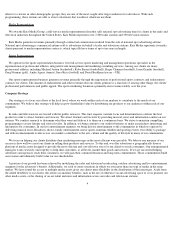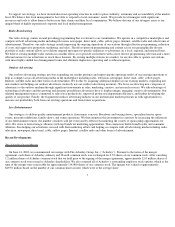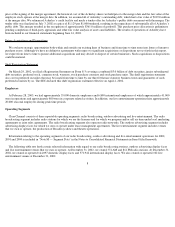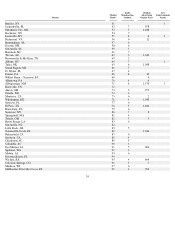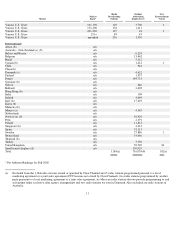iHeartMedia 2002 Annual Report Download - page 16
Download and view the complete annual report
Please find page 16 of the 2002 iHeartMedia annual report below. You can navigate through the pages in the report by either clicking on the pages listed below, or by using the keyword search tool below to find specific information within the annual report.
not subject to attribution unless such interests implicate the FCC’s “equity/debt plus,”or “EDP,”rule. Under the EDP rule, an aggregate
interest in excess of 33% of a licensee’s total asset value (equity plus debt) is attributable if the interest holder is either a major program
supplier (providing over 15% of the licensee’s station’s total weekly broadcast programming hours) or a same-market media owner (including
broadcasters, cable operators, and newspapers). To the best of our knowledge at present, none of our officers, directors or five percent
stockholders holds an interest in another television station, radio station, cable television system or daily newspaper that is inconsistent with the
FCC’s ownership rules and policies.
Recent Developments and Future Actions Regarding Multiple Ownership Rules
Expansion of our broadcast operations in particular areas and nationwide will continue to be subject to the FCC’sownershiprulesandany
further changes the FCC or Congress may adopt. Recent actions by and pending proceedings before the FCC and the courts may significantly
affect our business.
The 1996 Act requires the FCC to review its remaining ownership rules biennially as part of its regulatory reform obligations to determine
whether its various rules are still necessary. The first such biennial review concluded on June 20, 2000, with the FCC’s issuance of a report
retaining the 35% national television reach limitation and the limits on the number of radio stations a company may own in a given market. In
its report, however, the FCC stated its intention to commence separate proceedings requesting specific comment on several of its rules,
including possible revisions to the manner in which the FCC counts stations for purposes of the local radio multiple ownership rule. The FCC
later commenced, and in one case completed, proceedings to modify certain rules. In January 2001, the FCC completed its 2000 biennial
review, making no additional relevant changes to its ownership rules.
Pursuant to its determination in the initial biennial review, in December 2000 the FCC solicited public comment on a variety of possible
changes in the methodology by which it defines a radio “market”and counts stations for purposes of determining compliance with the local
radio ownership restrictions. Moreover, in the same proceeding, the FCC announced a policy of deferring, until the rulemaking is completed,
certain pending and future radio sale applications which raise “concerns”about how the FCC counts the number of stations a company may
own in a market. This deferral policy has delayed FCC approval of our acquisition of two radio stations in one pending transaction, and may
delay additional acquisitions for which we seek FCC approval in the future.
In November 2001, the FCC subsumed its pending market definition/station counting rulemaking into a larger, more comprehensive
proceeding to review all aspects of the agency’s local radio multiple ownership rules. In this proceeding the FCC has solicited comment on a
wide range of issues, including, among other things, whether it may or should modify its local radio multiple ownership rules to address
concerns of undue market concentration. The FCC has also requested comment on future regulatory treatment of radio LMAs and radio joint
sales agreements (“JSAs”). As part of this proceeding, the FCC announced an interim policy and processing timetables with respect to pending
radio acquisitions which it had delayed under its then-existing policy of “flagging”certain radio acquisitions for additional concentration
review, as well as future radio acquisitions which in the FCC’s view warrant additional concentration review. Under this interim policy, in
many cases the FCC’s staff has requested the parties to provide additional information regarding the acquisition’s effect on competition in the
local radio market. We have been requested to provide and have submitted such information with respect to eleven of our radio purchase
transactions. In five of these cases, the FCC approved our acquisition. With respect to six of these transactions, however, the FCC stated that it
was “unable to make the required finding that the public interest, convenience and necessity will be served”by approving the acquisition “in
light of the questions raised in the context”of its competition analysis. With respect to each of these transactions, the FCC gave us the option o
f
undergoing an administrative hearing or awaiting the outcome of the FCC’s pending rulemaking to review its ownership rules. We have
terminated one of these transactions. With respect to the others, we have opted to await the outcome of the pending rulemaking. We cannot
predict the extent to which certain of our radio transactions now pending before the FCC, or radio transactions for which we seek approval in
the future, may be delayed as a result of the FCC’s interim policy.
In September 2002, the FCC commenced its third biennial review of its media ownership rules. The FCC intends in this proceeding to
comprehensively review all of these rules. It has incorporated into this omnibus review a number of its separate pending proceedings on
various rules, including its previously-commenced rulemakings concerning the local radio ownership rules and radio market definition/station
counting methodology. The omnibus review also covers media ownership rules not already the subject of separate rulemaking proceedings,
including the local and national television ownership limits and the radio/television cross-ownership rule.
16


